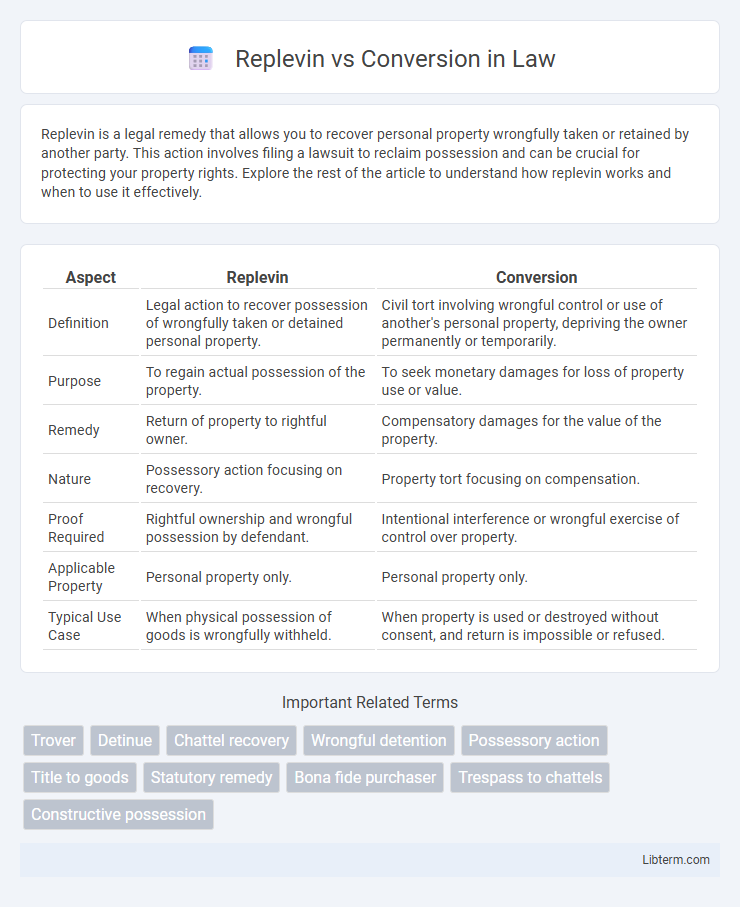Replevin is a legal remedy that allows you to recover personal property wrongfully taken or retained by another party. This action involves filing a lawsuit to reclaim possession and can be crucial for protecting your property rights. Explore the rest of the article to understand how replevin works and when to use it effectively.
Table of Comparison
| Aspect | Replevin | Conversion |
|---|---|---|
| Definition | Legal action to recover possession of wrongfully taken or detained personal property. | Civil tort involving wrongful control or use of another's personal property, depriving the owner permanently or temporarily. |
| Purpose | To regain actual possession of the property. | To seek monetary damages for loss of property use or value. |
| Remedy | Return of property to rightful owner. | Compensatory damages for the value of the property. |
| Nature | Possessory action focusing on recovery. | Property tort focusing on compensation. |
| Proof Required | Rightful ownership and wrongful possession by defendant. | Intentional interference or wrongful exercise of control over property. |
| Applicable Property | Personal property only. | Personal property only. |
| Typical Use Case | When physical possession of goods is wrongfully withheld. | When property is used or destroyed without consent, and return is impossible or refused. |
Understanding Replevin: Definition and Purpose
Replevin is a legal action aimed at recovering possession of personal property wrongfully taken or detained by another party. Its primary purpose is to allow the rightful owner to reclaim their property rather than merely seeking monetary damages. This remedy is particularly significant in cases where the return of specific items holds greater importance than financial compensation.
What is Conversion: Key Legal Principles
Conversion is a tort involving the wrongful exercise of dominion over another's personal property, depriving the owner of its use or possession without consent. Key legal principles include the unauthorized act, the intent to exercise control inconsistent with the owner's rights, and resulting harm or deprivation. Courts often require proof of ownership, wrongful interference, and damages to establish a successful claim for conversion.
Replevin vs. Conversion: Fundamental Differences
Replevin involves a legal action to recover possession of wrongfully taken or detained personal property, emphasizing the return of the specific item itself. Conversion is a tort that addresses the wrongful exercise of ownership or control over another's property, focusing on compensation for the value of the property rather than its recovery. The fundamental difference lies in replevin seeking the property's return, while conversion seeks monetary damages for its loss or deprivation.
Elements Required to Prove Replevin
To prove replevin, the plaintiff must establish rightful possession or ownership of the specific personal property and a wrongful deprivation or holding by the defendant. Evidence must show a clear entitlement to immediate possession, distinguishing it from conversion, which focuses on unauthorized control and damages. The plaintiff must also demonstrate a demand for return and refusal by the defendant, emphasizing the property's specific recovery rather than monetary compensation.
Elements Needed for a Conversion Claim
Conversion claims require proving ownership or legal possession of the property, the defendant's wrongful act of dominion or control over the property, and resulting damages caused by the interference. The defendant's act must be intentional and inconsistent with the plaintiff's rights, demonstrating an unauthorized exercise of control. Establishing these elements differentiates conversion from related torts like replevin, which focuses on the recovery of wrongfully taken property rather than damages.
Remedies Available in Replevin Actions
Replevin actions primarily provide the remedy of recovering the specific wrongful detainment of personal property, allowing the plaintiff to regain possession before a final judgment. Courts may also award damages for the unlawful withholding or for the diminished value of the property. Unlike conversion, which typically results in monetary damages compensating for the property's value, replevin emphasizes the return of the actual item to the rightful owner.
Remedies in Conversion Lawsuits
Remedies in conversion lawsuits primarily involve monetary damages aimed at compensating the plaintiff for the fair market value of the wrongfully taken or retained property, reflecting the loss suffered. Courts may also order the return of the property itself if it remains identifiable and recoverable, providing a restitutionary remedy. Punitive damages are occasionally awarded in cases involving willful or malicious conversion, serving to deter egregious misconduct beyond mere compensation.
Common Legal Defenses in Replevin and Conversion
Common legal defenses in replevin include lawful possession, consent, and lack of wrongful detention, emphasizing the plaintiff's failure to prove immediate right to possession. In conversion cases, defenses often involve authorization, abandonment, or the property's destruction without the defendant's fault, highlighting the absence of intent to deprive the owner permanently. Both defenses require careful examination of property rights, possession history, and the intent behind the defendant's actions to determine liability.
Practical Examples: Replevin and Conversion Cases
Replevin cases typically involve the rightful owner seeking the return of specific personal property wrongfully taken or withheld, such as a tenant reclaiming a leased vehicle or an individual recovering a stolen laptop through legal action. Conversion cases generally center on the wrongful exercise of dominion over another person's property, like a mechanic refusing to return a repaired car without payment or a buyer selling goods they never owned. These practical examples highlight replevin's emphasis on possession recovery versus conversion's focus on compensation for unlawful use or control of property.
Choosing the Right Action: Replevin or Conversion?
Choosing between replevin and conversion hinges on the desired legal remedy and the nature of property possession. Replevin focuses on recovering wrongfully detained specific personal property and restoring possession to the rightful owner, making it ideal when physical return of the property is sought. Conversion suits situations where the property is wrongfully retained, used, or disposed of, allowing the owner to claim monetary damages equivalent to the property's value.
Replevin Infographic

 libterm.com
libterm.com